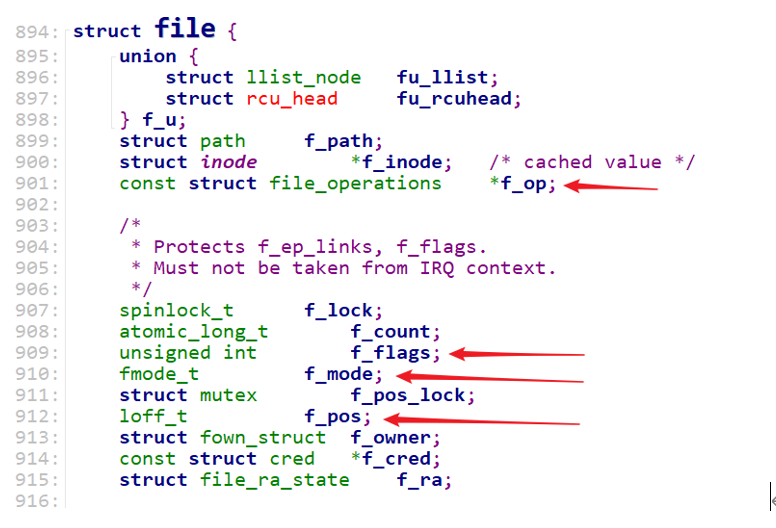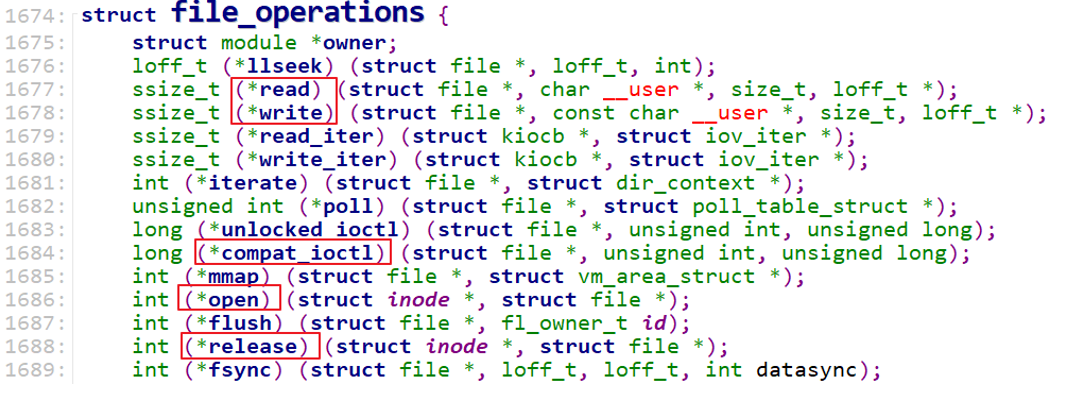1. open后返回的file
应用程序open一个文件时,可以得到一个整数,这个整数被称为文件句柄。对于应用程序的每一个文件句柄,在内核里面都有一个“struct file”与之对应。
我们使用open打开文件时,传入的flags、mode等参数会被记录在内核中对应的struct file结构体里(f_flags、f_mode):
int open(const char *pathname, int flags, mode_t mode);
去读写文件时,文件的当前偏移地址也会保存在struct file结构体的f_pos成员里。
2.打开字符设备节点时,内核中也有对应的struct file
注意这个结构体中的结构体:struct file_operations *f_op,这是由驱动程序提供的。

结构体struct file_operations的定义如下:

3.怎么编写驱动程序?
① 确定主设备号,也可以让内核分配
② 定义自己的file_operations结构体
③ 实现对应的drv_open/drv_read/drv_write等函数,填入file_operations结构体
④ 把file_operations结构体告诉内核:register_chrdev
⑤ 谁来注册驱动程序啊?得有一个入口函数:安装驱动程序时,就会去调用这个入口函数
⑥ 有入口函数就应该有出口函数:卸载驱动程序时,出口函数调用unregister_chrdev
⑦ 其他完善:提供设备信息,自动创建设备节点:class_create, device_create
4.驱动程序
#include <linux/module.h> #include <linux/fs.h> #include <linux/errno.h> #include <linux/miscdevice.h> #include <linux/kernel.h> #include <linux/major.h> #include <linux/mutex.h> #include <linux/proc_fs.h> #include <linux/seq_file.h> #include <linux/stat.h> #include <linux/init.h> #include <linux/device.h> #include <linux/tty.h> #include <linux/kmod.h> #include <linux/gfp.h> /* 1. 确定主设备号 */ static int major = 0; static char kernel_buf[1024]; static struct class *hello_class; #define MIN(a, b) (a < b ? a : b) /* 3. 实现对应的open/read/write等函数,填入file_operations结构体 */ static ssize_t hello_drv_read (struct file *file, char __user *buf, size_t size, loff_t *offset) { int err; printk("%s %s line %d ", __FILE__, __FUNCTION__, __LINE__); err = copy_to_user(buf, kernel_buf, MIN(1024, size)); return MIN(1024, size); } static ssize_t hello_drv_write (struct file *file, const char __user *buf, size_t size, loff_t *offset) { int err; printk("%s %s line %d ", __FILE__, __FUNCTION__, __LINE__); err = copy_from_user(kernel_buf, buf, MIN(1024, size)); return MIN(1024, size); } static int hello_drv_open (struct inode *node, struct file *file) { printk("%s %s line %d ", __FILE__, __FUNCTION__, __LINE__); return 0; } static int hello_drv_close (struct inode *node, struct file *file) { printk("%s %s line %d ", __FILE__, __FUNCTION__, __LINE__); return 0; } /* 2. 定义自己的file_operations结构体 */ static struct file_operations hello_drv = { .owner = THIS_MODULE, .open = hello_drv_open, .read = hello_drv_read, .write = hello_drv_write, .release = hello_drv_close, }; /* 4. 把file_operations结构体告诉内核:注册驱动程序 */ /* 5. 谁来注册驱动程序啊?得有一个入口函数:安装驱动程序时,就会去调用这个入口函数 */ static int __init hello_init(void) { int err; printk("%s %s line %d ", __FILE__, __FUNCTION__, __LINE__); major = register_chrdev(0, "hello", &hello_drv); /* /dev/hello */ hello_class = class_create(THIS_MODULE, "hello_class"); err = PTR_ERR(hello_class); if (IS_ERR(hello_class)) { printk("%s %s line %d ", __FILE__, __FUNCTION__, __LINE__); unregister_chrdev(major, "hello"); return -1; } device_create(hello_class, NULL, MKDEV(major, 0), NULL, "hello"); /* /dev/hello */ return 0; } /* 6. 有入口函数就应该有出口函数:卸载驱动程序时,就会去调用这个出口函数 */ static void __exit hello_exit(void) { printk("%s %s line %d ", __FILE__, __FUNCTION__, __LINE__); device_destroy(hello_class, MKDEV(major, 0)); class_destroy(hello_class); unregister_chrdev(major, "hello"); } /* 7. 其他完善:提供设备信息,自动创建设备节点 */ module_init(hello_init); module_exit(hello_exit); MODULE_LICENSE("GPL");
5.应用程序
#include <sys/types.h> #include <sys/stat.h> #include <fcntl.h> #include <unistd.h> #include <stdio.h> #include <string.h> /* * ./hello_drv_test -w abc * ./hello_drv_test -r */ int main(int argc, char **argv) { int fd; char buf[1024]; int len; /* 1. 判断参数 */ if (argc < 2) { printf("Usage: %s -w <string> ", argv[0]); printf(" %s -r ", argv[0]); return -1; } /* 2. 打开文件 */ fd = open("/dev/hello", O_RDWR); if (fd == -1) { printf("can not open file /dev/hello "); return -1; } /* 3. 写文件或读文件 */ if ((0 == strcmp(argv[1], "-w")) && (argc == 3)) { len = strlen(argv[2]) + 1; len = len < 1024 ? len : 1024; write(fd, argv[2], len); } else { len = read(fd, buf, 1024); buf[1023] = '�'; printf("APP read : %s ", buf); } close(fd); return 0; }
6.Makefile
# 1. 使用不同的开发板内核时, 一定要修改KERN_DIR # 2. KERN_DIR中的内核要事先配置、编译, 为了能编译内核, 要先设置下列环境变量: # 2.1 ARCH, 比如: export ARCH=arm64 # 2.2 CROSS_COMPILE, 比如: export CROSS_COMPILE=aarch64-linux-gnu- # 2.3 PATH, 比如: export PATH=$PATH:/home/book/100ask_roc-rk3399-pc/ToolChain-6.3.1/gcc-linaro-6.3.1-2017.05-x86_64_aarch64-linux-gnu/bin # 注意: 不同的开发板不同的编译器上述3个环境变量不一定相同, # 请参考各开发板的高级用户使用手册 KERN_DIR = /home/book/100ask_roc-rk3399-pc/linux-4.4 all: make -C $(KERN_DIR) M=`pwd` modules $(CROSS_COMPILE)gcc -o hello_drv_test hello_drv_test.c clean: make -C $(KERN_DIR) M=`pwd` modules clean rm -rf modules.order rm -f hello_drv_test obj-m += hello_drv.o